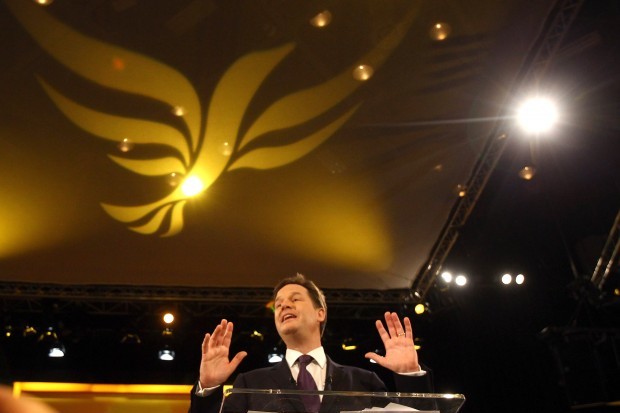The election of the deputy leader of the Liberal Democrat parliamentary party is hardly hold the front page stuff. However, whoever wins the contest, triggered this week by Simon Hughes’ surprise elevation to ministerial office, will give us a good indication as to where the party currently sees itself.
The election is decided by a vote of Lib Dem MPs, as that is who the deputy leader is there to represent, and can only be contested by those who are not ministers. Coaltion has forced the Lib Dems to look at where they stand ideologically, and who the MPs select as their deputy leader will give a strong indication of their ‘spiritual’ positioning.
A left-wing candidate would show a determination of the party to keep themselves within touching distance of Labour. A win for a more Orange Book candidate, like Jeremy Browne, would certainly be a major victory for that wing of the party, solidifying their position at the top of the Lib Dems.
Disappointingly the Speccie’s Steerpike has revealed a lack of support for Browne, who is my preferred candidate. There are other former ministers very much in the reckoning though, particularly Sir Nick Harvey and Mike Moore.
Harvey, a strong runner in this contest, was said to have turned downed a return to government as the party’s chief whip at the last reshuffle, on the grounds that he did not want to lose his public voice. The deputy leadership would certainly give him that.
Moore is popular among colleagues, and team Clegg. Many felt he was harshly treated when he was a surprise cabinet casualty, sacked as Scottish Secretary, and so I’m sure he could drum up support if he wanted it.
As well as ideological issues to settle, the Lib Dems are still trying to get more women into prominent roles. A senior Lib Dem source tells me that there is a ‘strong case for a woman’ to take the role, and others agree. The options here are, depressingly, rather limited. Jo Swinson is a minister, and is being covered on maternity leave by Jenny Willott, counting them both out.
The women MPs who are out office are Tessa Munt, Annette Brooke and Sarah Teather, and Lorely Burt. Brooke is standing down at the next election, and Teather is unpopular and isolated amongst parliamentary colleagues, leaving Munt and Burt as the outstanding candidates.
While Munt has avoided placing herself too keenly in one wing of the Lib Dems, she would probably keep social liberals happy while not offending the orange bookers too greatly. However, she is currently PPS to Vince Cable, and that’s a key factor against her.
This election is massively about the internal politics of the Lib Dems. As another well placed source put it, it’s ‘about the politics of the big four or five,’ and why would Clegg’s team allow someone close to Cable into the role, when they’ve “spent 18 months putting him in his box”? Given that the winner is also likely to be able to make a strong bid for the leadership next time around ‘if you’re Danny [Alexander], do you put in someone good?’
Lorely Burt is good, and has already chaired the parliamentary party. She has a wafer thin majority, and the extra profile and space to criticise the Conservatives the role would provide may well help her election campaign. ‘If I was putting money on, I’d put it on Lorely’ says my source. Indeed, they believe that she will be ‘proposed and seconded by some very important people’.
As is so often the case with seemingly insignificant skirmishes, the Lib Dem deputy leadership contest is a proxy for ongoing clashes amongst bigger beasts.






Comments